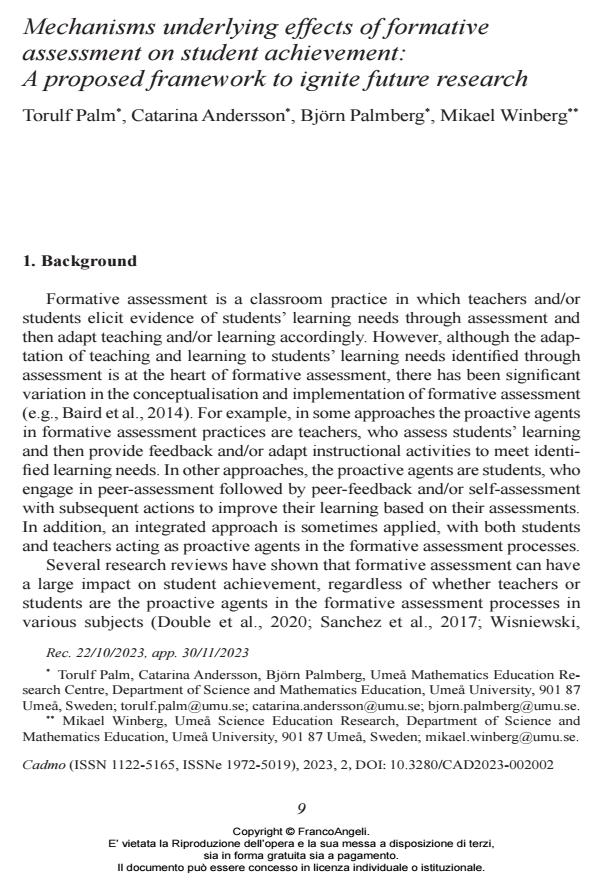Mechanisms underlying effects of formative assessment on student achievement: A proposed framework to ignite future research
Titolo Rivista CADMO
Autori/Curatori Torulf Palm, Catarina Andersson, Björn Palmberg, Mikael Winberg
Anno di pubblicazione 2024 Fascicolo 2023/2
Lingua Inglese Numero pagine 12 P. 9-20 Dimensione file 202 KB
DOI 10.3280/CAD2023-002002
Il DOI è il codice a barre della proprietà intellettuale: per saperne di più
clicca qui
Qui sotto puoi vedere in anteprima la prima pagina di questo articolo.
Se questo articolo ti interessa, lo puoi acquistare (e scaricare in formato pdf) seguendo le facili indicazioni per acquistare il download credit. Acquista Download Credits per scaricare questo Articolo in formato PDF

FrancoAngeli è membro della Publishers International Linking Association, Inc (PILA), associazione indipendente e non profit per facilitare (attraverso i servizi tecnologici implementati da CrossRef.org) l’accesso degli studiosi ai contenuti digitali nelle pubblicazioni professionali e scientifiche.
Research has shown that formative assessment can have large positive effects on student achievement, but the effects vary substantially and are not always positive. In addition, the underlying mechanisms responsible for the learning effects are not well understood. We present a framework developed to support research efforts to identify these mechanisms. The framework includes formative assessment processes as well as students’ learning processes, defines and exemplifies the term mechanisms in relevant contexts, indicates possible mechanisms, and identifies aspects that require further research to characterise and explain the mechanisms through which formative assessment affects student achievement. Finally, we exemplify how the framework may be used to design studies capable of providing the robust evidence required for drawing conclusions about the mechanisms.
Parole chiave:Formative assessment, Assessment for learning, Framework, Mechanisms, Mathematics.
- A multi-approach formative assessment practice and its potential for enhancing student motivation: a case study Björn Palmberg, Carina Granberg, Catarina Andersson, Torulf Palm, in Cogent Education 2371169/2024
DOI: 10.1080/2331186X.2024.2371169
Torulf Palm, Catarina Andersson, Björn Palmberg, Mikael Winberg, Mechanisms underlying effects of formative assessment on student achievement: A proposed framework to ignite future research in "CADMO" 2/2023, pp 9-20, DOI: 10.3280/CAD2023-002002